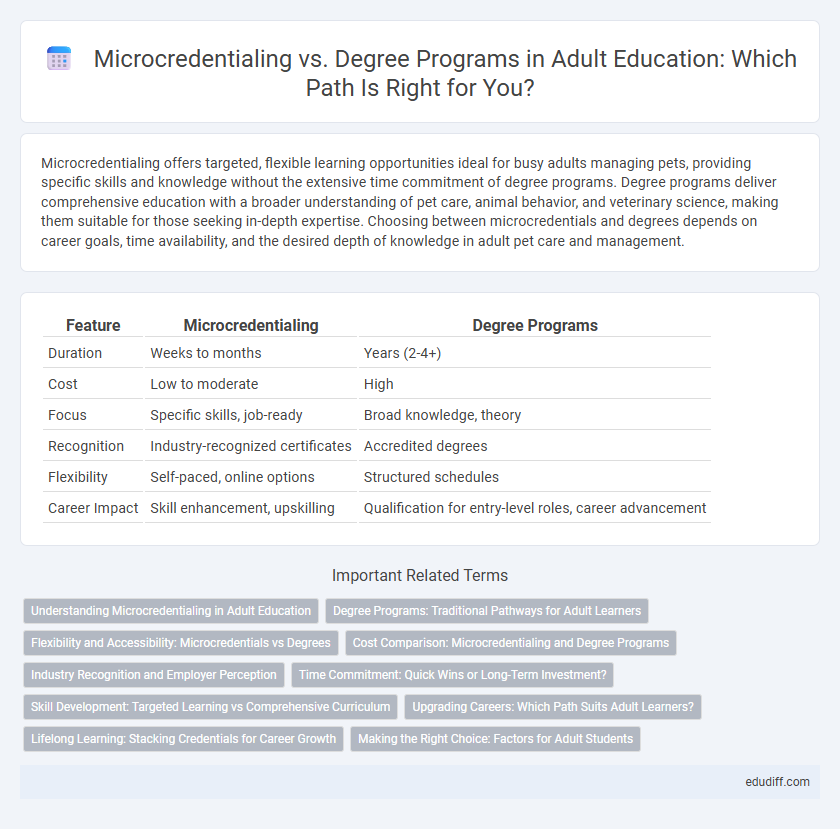Microcredentialing offers targeted, flexible learning opportunities ideal for busy adults managing pets, providing specific skills and knowledge without the extensive time commitment of degree programs. Degree programs deliver comprehensive education with a broader understanding of pet care, animal behavior, and veterinary science, making them suitable for those seeking in-depth expertise. Choosing between microcredentials and degrees depends on career goals, time availability, and the desired depth of knowledge in adult pet care and management.
Table of Comparison
| Feature | Microcredentialing | Degree Programs |
|---|---|---|
| Duration | Weeks to months | Years (2-4+) |
| Cost | Low to moderate | High |
| Focus | Specific skills, job-ready | Broad knowledge, theory |
| Recognition | Industry-recognized certificates | Accredited degrees |
| Flexibility | Self-paced, online options | Structured schedules |
| Career Impact | Skill enhancement, upskilling | Qualification for entry-level roles, career advancement |
Understanding Microcredentialing in Adult Education
Microcredentialing in adult education offers targeted, skill-specific certifications that address immediate industry demands, providing flexibility and faster completion compared to traditional degree programs. These credentials validate practical expertise and can be stacked toward advanced qualifications, enhancing career mobility for adult learners. Employers increasingly recognize microcredentials for their relevance in evolving job markets, making them a strategic choice for continuous professional development.
Degree Programs: Traditional Pathways for Adult Learners
Degree programs remain a cornerstone for adult learners seeking comprehensive education and recognized qualifications, offering structured curricula that build foundational and advanced skills over several years. These programs provide access to extensive resources, networking opportunities, and reputable credentials that often carry more weight in professional advancement. While microcredentialing presents flexible learning options, degree programs deliver depth, academic rigor, and a holistic educational experience essential for career growth and long-term success.
Flexibility and Accessibility: Microcredentials vs Degrees
Microcredentialing offers greater flexibility and accessibility compared to traditional degree programs by allowing learners to acquire specific skills through shorter, modular courses often delivered online. These programs cater to working adults and non-traditional students by enabling self-paced learning without the need for full-time enrollment or campus attendance. In contrast, degree programs typically require a longer time commitment, fixed schedules, and on-campus presence, making microcredentials a more adaptable option for continuous professional development.
Cost Comparison: Microcredentialing and Degree Programs
Microcredentialing offers a cost-effective alternative to traditional degree programs, often ranging from a few hundred to a few thousand dollars compared to tens of thousands for degrees. This affordability allows adult learners to upskill or reskill with minimal financial risk while avoiding long-term student debt. Degree programs typically include higher tuition, fees, and additional costs such as textbooks and campus services, making microcredentials a practical choice for budget-conscious adults.
Industry Recognition and Employer Perception
Microcredentialing offers targeted skill validation that aligns closely with current industry demands, often resulting in faster employer recognition in specialized fields. Degree programs provide comprehensive education and brand reputation that many employers associate with long-term reliability and foundational knowledge. Employers increasingly value microcredentials for their ability to demonstrate up-to-date competencies, while degrees remain a benchmark for traditional career pathways.
Time Commitment: Quick Wins or Long-Term Investment?
Microcredentialing offers accelerated skill acquisition with courses typically completed in weeks, enabling adult learners to quickly enhance employability and adapt to industry demands. Degree programs require a significant time investment, often spanning multiple years, providing comprehensive knowledge and long-term career advantages. Choosing between microcredentials and degrees depends on whether the priority is immediate, focused learning or deep, sustained academic development.
Skill Development: Targeted Learning vs Comprehensive Curriculum
Microcredentialing offers targeted learning focused on specific skills, enabling adults to quickly acquire and demonstrate proficiency in niche areas relevant to evolving job markets. Degree programs provide a comprehensive curriculum that fosters broad foundational knowledge and critical thinking, supporting long-term career growth and adaptability. Prioritizing microcredentials can enhance immediate employability, while degrees build a versatile skill set for diverse professional challenges.
Upgrading Careers: Which Path Suits Adult Learners?
Microcredentialing offers adult learners targeted skills in shorter timeframes, accelerating career upgrades with credentials highly valued by employers in industries like IT and healthcare. Degree programs provide comprehensive knowledge and foundational expertise, often preferred for leadership roles and professions requiring formal accreditation. Adults must weigh immediate job market demands against long-term career goals to select the optimal educational pathway.
Lifelong Learning: Stacking Credentials for Career Growth
Microcredentialing offers flexible, focused skill development that complements traditional degree programs, enabling lifelong learners to adapt quickly to evolving job markets. Stacking diverse microcredentials allows professionals to build a customized portfolio of expertise, enhancing career growth and employability without the time and financial commitment of a full degree. Employers increasingly recognize stacked credentials as evidence of continuous learning and practical proficiency, aligning with the demand for agile, up-to-date workforce capabilities.
Making the Right Choice: Factors for Adult Students
Adult students frequently weigh factors like flexibility, cost, and time investment when choosing between microcredentialing and degree programs. Microcredentials offer targeted skill development and faster completion, ideal for career pivots or upskilling, while degree programs provide comprehensive knowledge and accredited qualifications often preferred by employers. Evaluating career goals, industry requirements, and personal commitments ensures selecting the most effective educational pathway for long-term success.
Microcredentialing vs Degree Programs Infographic

 edudiff.com
edudiff.com